- Home
- Tobias Wolff
In the Garden of the North American Martyrs Page 5
In the Garden of the North American Martyrs Read online
Page 5
He started to talk almost the moment he sat down, and he didn’t stop until we reached Wallingford. Was I going to Choate? What a coincidence—so was he. My first year? His too. Where was I from? Oregon? No shit? Way the hell and gone up in the boondocks, eh? He was from Indiana—Gary, Indiana. I knew the song, didn’t I? I did, but he sang it for me anyway, all the way through, including the tricky ending. There were other boys in the coach, and they were staring at us, and I wished he would shut up.
Did I swim? Too bad, it was a good sport, I ought to go out for it. He had set a free-style record in the Midwestern conference the year before. What was my favorite subject? He liked math, he guessed, but he was pretty good at all of them. He offered me a cigarette, which I refused.
“I oughta quit myself,” he said. “Be the death of me yet.”
Eugene was a scholarship boy. One of his teachers told him that he was too smart to be going to a regular high school and gave him a list of prep schools. Eugene applied to all of them—“just for the hell of it”—and all of them accepted him. He finally decided on Choate because only Choate had offered him a travel allowance. His father was dead and his mother, a nurse, had three other kids to support, so Eugene didn’t think it would be fair to ask her for anything. As the train came into Wallingford he asked me if I would be his roommate.
I didn’t jump at the offer. For one thing, I did not like to look at Eugene. His head was too big for his lanky body, and his skin was oily. He put me in mind of a seal. Then there was the matter of his scholarship. I too was a scholarship boy, and I didn’t want to finish myself off before I even got started by rooming with another, the way fat girls hung out together back home. I knew the world Eugene came from. I came from that world myself, and I wanted to leave it behind. To this end I had practiced over the summer an air of secret amusement which I considered to be aristocratic, an association encouraged by English movie actors. I had studied the photographs of the boys in the prep school bulletins, and now my hair looked like their hair and my clothes looked like their clothes.
I wanted to know boys whose fathers ran banks and held Cabinet office and wrote books. I wanted to be their friend and go home with them on vacation and someday marry one of their sisters, and Eugene Miller didn’t have much of a place in those plans. I told him that I had a friend at Choate with whom I’d probably be rooming.
“That’s okay,” he said. “Maybe next year.”
I assented vaguely, and Eugene returned to the problem he was having deciding whether to go out for baseball or lacrosse. He was better at baseball, but lacrosse was more fun. He figured maybe he owed it to the school to go out for baseball.
As things worked out, our room assignments were already drawn up. My roommate was a Chilean named Jaime who described himself as a Nazi. He had an enormous poster of Adolph Hitler tacked above his desk until a Jewish boy on our hall complained and the dean made him take it down. Jaime kept a copy of Mein Kampf beside his bed like a Gideons Bible and was fond of reading aloud from it in a German accent. He enjoyed practical jokes. Our room overlooked the entrance to the headmaster’s house and Jaime always whistled at the headmaster’s ancient secretary as she went home from work at night. On Alumni Day he sneaked into the kitchen and spiced up the visitors’ mock turtle soup with a number of condoms, unrolled and obscenely knotted. The next day at chapel the headmaster stammered out a sermon about the incident, but he referred to it in terms so coy and oblique that nobody knew what he was talking about. Ultimately the matter was dropped without another word. Just before Christmas Jaime’s mother was killed in a plane crash, and he left school and never returned. For the rest of the year I roomed alone.
Eugene drew as his roommate Talbot Nevin. Talbot’s family had donated the Andrew Nevin Memorial Hockey Rink and the Andrew Nevin Memorial Library to the school, and endowed the Andrew Nevin Memorial Lecture Series. Talbot Nevin’s father had driven his car to second place in the Monaco Grand Prix two years earlier, and celebrity magazines often featured a picture of him with someone like Jill St. John and a caption underneath quoting one of them as saying, “We’re just good friends.” I wanted to know Talbot Nevin.
So one day I visited their room. Eugene met me at the door and pumped my hand. “Well, what do you know,” he said. “Tab, this here’s a buddy of mine from Oregon. You don’t get any farther up in the boondocks than that.”
Talbot Nevin sat on the edge of his bed, threading snow-white laces through the eyes of a pair of dirty sneakers. He nodded without raising his head.
“Tab’s father won some big race last year,” Eugene went on, to my discomfort. I didn’t want Talbot to know that I had heard anything about him. I wanted to come to him fresh, with no possibility of his suspecting that I liked him for anything but himself.
“He didn’t win. He came in second.” Talbot threw down the sneakers and looked up at me for the first time. He had china-blue eyes under lashes and brows so light you could hardly see them. His hair too was shock-white and lank on his forehead. His face had a molded look, like a doll’s face, delicate and unhealthy.
“What kind of race?” I asked.
“Grand Prix,” he said, taking off his shoes.
“That’s a car race,” Eugene said.
Not to have heard of the Grand Prix seemed to me evidence of too great ignorance. “I know. I’ve heard of it.”
“The guys down the hall were talking about it and they said he won.” Eugene winked at me as he spoke; he winked continuously as if everything he said was part of a ritual joke and he didn’t want a tenderfoot like me to take it too seriously.
“Well, I say he came in second and I damn well ought to know.” By now Talbot had changed to his tennis shoes. He stood. “Let’s go have a weed.”
Smoking at Choate was forbidden. “The use of tobacco in any form,” said the student handbook, “carries with it the penalty of immediate expulsion.” Up to this moment the rule against smoking had not been a problem for me because I did not smoke. Now it was a problem, because I did not want Eugene to have a bond with Talbot that I did not share. So I followed them downstairs to the music room, where the choir practiced. Behind the conductor’s platform was a long, narrow closet where the robes were kept. We huddled in the far end of this closet and Talbot passed out cigarettes. The risk was great and the activity silly, and we started to giggle.
“Welcome to Marlboro Country,” I said.
“It’s what’s up front that counts,” Talbot answered. We were smoking Marlboros, not Winstons, and the joke was lame, but I guffawed anyway.
“Better keep it down,” Eugene whispered. “Big John might hear us.”
Big John was the senior dorm master. He wore three-piece suits and soft-soled shoes and had a way of popping up at awkward moments. He liked to grab boys by the neck, pinching the skin between his forefinger and thumb, squeezing until they cried. “Fuck Big John,” I said.
Neither Talbot nor Eugene responded. I fretted in the silence as we finished our cigarettes. I had intended to make Eugene look timid. Had I made myself look frivolous instead?
I saw Talbot several times that week and he barely nodded to me. I had been rash, I decided. I had made a bad impression on him. But on Friday night he came up as we were leaving the dining hall and asked me if I wanted to play tennis the next morning. I doubt that I have ever felt such complete self-satisfaction as I felt that night.
Talbot missed our appointment, however, so I dropped by his room. He was still in bed, reading. “What’s going on?” he asked, without looking up from his book.
I sat on Eugene’s bed and tried not to sound as disappointed as I was. “I thought we might play a little tennis.”
“Tennis?” He continued reading silently for a few moments. “I don’t know. I don’t feel so hot.”
“No big deal. I thought you wanted to play. We could just knock a couple of balls around.”
“Hell.” He lowered the book onto his chest. “What time is it?”
> “Nine o’clock.”
“The courts’ll be full by now.”
“There’s always a few empty ones behind the science building.”
“They’re asphalt, aren’t they?”
“Cement.” I shrugged. I didn’t want to seem pushy. “Like I said, no big deal. We can play some other time.” I stood and walked toward the door.
“Wait.” Talbot yawned without covering his mouth. “What the hell.”
As it happened, the courts were full. Talbot and I sat on the grass and I asked him questions I already knew the answers to, like where was he from and where had he gone to school the year before and who did he have for English. At this question he came to life. “English? Parker, the bald one. I got A’s all through school and now Parker tells me I can’t write. If he’s such a goddamned William Shakespeare what’s he teaching here for?”
We sat for a time without speaking. “I’m from Oregon,” I said finally. “Near Portland.” We didn’t live close enough to the city to call it near, I suppose, but in those days I naively assumed everyone had heard of Portland.
“Oregon.” He pondered this. “Do you hunt?”
“I’ve been a few times with my father.”
“What kind of weapon do you use?”
“Marlin.”
“30-30?”
I nodded.
“Good brush gun,” he said. “Useless over a hundred yards. Have you ever killed anything?”
“Deer, you mean?”
“Deer, elk, whatever you hunt in Oregon.”
“No.”
Talbot had killed a lot of animals, and he named them for me: deer, moose, bear, elk, even an alligator. There were more, many more.
“Maybe you can come out West and go hunting with us sometime.”
“Where, to Oregon?” Talbot looked away. “Maybe.”
I had not expected to be humiliated on the court. My brother, who played tennis for Oregon State, had coached me through four summers. I had a good hot serve and my brother described my net game as “ruthless.” Talbot ran me ragged. He played a kind of tennis different from any I had ever seen. He did not sweat, not the way I did anyway, or pant, or swear when he missed a shot, or get that thin quivering smile that tugged my lips whenever I aced my opponents. He seemed hardly to notice me, gave no sign that he was competing except that twice he called shots out that appeared to me to be well short of the line. I might have been mistaken, though. After he won the second set he walked abruptly off the court and went back to where we had left our sweaters. I followed him.
“Good game,” I said.
He pulled impatiently at the sleeve of his sweater. “I can’t play on these lousy asphalt courts.”
Eugene made himself known around school. You did not wear belted jackets at Choate, or white buck shoes. Certainly you did not wear Alpine hats with feathers stuck in the brim. Eugene wore all three.
Anyone who didn’t know who Eugene was found out by mid-November. Life magazine ran a series of interviews and pictures showing what it was like to be a student at a typical Eastern prep school. They had based their piece on research done at five schools, of which ours was one. Eugene had been interviewed and one of his remarks appeared in bold face beneath a photograph of students bent morosely over their books in evening study hall. The quotation: “One thing, nobody at Choate ever seems to smile. They think you’re weird or something if you smile. You get dumped on all the time.”
True enough. We were a joyless lot. Laughter was acceptable only in the sentimental parts of the movies we were shown on alternate Saturday nights. The one category in the yearbook to which everyone aspired was “Most Sarcastic.” The arena for these trials of wit was the dining room, and Eugene’s statements in Life did nothing to ease his load there.
However conspicuous Eugene may have been, he was not unpopular. I never heard anything worse about him than that he was “weird.” He did well in his studies, and after the swimming team began to practice, the word went around that Eugene promised to put Choate in the running for the championship. So despite his hat and his eagerness and his determined grin, Eugene escaped the fate I had envisioned for him: the other students dumped on him but they didn’t cast him out.
The night before school recessed for Christmas I went up to visit Talbot and found Eugene alone in the room, packing his bags. He made me sit down and poured out a glass of Hawaiian Punch which he laced with some murky substance from a prescription bottle. “Tab rustled up some codeine down at the infirmary,” he explained. “This’ll get the old Yule log burning.”
The stuff tasted filthy but I took it, as I did all the other things that made the rounds at school and were supposed to get you off but never did, like aspirin and Coke, after-shave lotion, and Ben-Gay stuffed in the nostrils. “Where’s Talbot?”
“I don’t know. Maybe over at the library.” He reached under his bed and pulled out a trunk-sized suitcase, made of cardboard but tricked up to look like leather, and began filling it with an assortment of pastel shirts with tab collars. Tab collars were another of Eugene’s flings at sartorial trailblazing at school. They made me think of what my mother always told my sister when she complained at having to wear Mother’s cast-off clothes: “You never know, you might start a fashion.”
“Where are you going for Christmas?” Eugene asked.
“Baltimore.”
“Baltimore? What’s in Baltimore?”
“My aunt and uncle live there. How about you?”
“I’m heading on up to Boston.”
This surprised me. I had assumed he would return to Indiana for the holidays. “Who do you know in Boston?”
“Nobody. Just Tab is all.”
“Talbot? You’re going to be staying with Talbot?”
“Yeah. And his family, of course.”
“For the whole vacation?”
Eugene gave a sly grin and rolled his eyes from side to side and said in a confidential tone, almost a whisper: “Old Tab’s got himself an extra key nobody knows about to his daddy’s liquor closet. We aim to do some very big drinking. And I mean very big.”
I went to the door. “If I don’t see you in the morning, have a Merry Christmas.”
“You bet, buddy. Same to you.” Eugene grabbed my right hand in both of his. His fingers were soft and damp. “Take it easy on those Baltimore girls. Don’t do anything I wouldn’t do.”
Jaime had been called home the week before by his mother’s death. His bed was stripped, the mattress doubled over. All the pictures in the room had gone with him, and the yellow walls glared blankly. I turned out the lights and sat on my bed until the bell rang for dinner.
I had never met my aunt or uncle before. They picked me up at the station in Baltimore with their four children, three girls and a boy. I disliked all of them immediately. During the drive home my aunt asked me if my poor father had ever learned to cope with my mother’s moods. One of the girls, Pammy, fell asleep on my lap and drooled on me.
They lived in Sherwood Park, a brick suburb several miles outside the city. My aunt and uncle went out almost every night and left me in charge of the children. This meant turning the television set on and turning it off when they had all passed out in front of it. Putting them to bed any earlier wasn’t in the cards. They held on to everything—carpets, electrical cords, the legs of tables and chairs—and when that failed tried to injure themselves by scratching and gouging at their own faces.
One night I broke down. I cried for almost an hour and tried to call Talbot to ask him if I could come up to Boston and stay with him. The Nevins’s number was unlisted, however, and after I washed my face and considered the idea again, I thought better of it.
When I returned to school my aunt and uncle wrote my father a letter which he sent on to me. They said that I was selfish and unenterprising. They had welcomed me as a son. They had opened their hearts to me, but I had taken no interest in them or in their children, my cousins, who worshipped the very ground I walked on
. They cited an incident when I was in the kitchen reading and the wind blew all my aunt’s laundry off the line and I hadn’t so much as asked if I could help. I just sat there and went right on reading and eating peanuts. Finally, my uncle was missing a set of cuff links that had great sentimental value for him. All things considered, they didn’t think my coming to Baltimore had worked out very well. They thought that on future vacations I would be happier somewhere else.
I wrote back to my father, denying all charges and making a few of my own.
After Christmas Talbot and I were often together. Both of us had gone out for basketball, and as neither of us was any good to the team—Talbot because of an ankle injury, me because I couldn’t make the ball go through the basket—we sat together on the bench most of the time. He told me Eugene had spoiled his stepmother’s Christmas by leaning back in an antique chair and breaking it. Thereafter I thought of Mrs. Nevin as a friend; but I had barely a month to enjoy the alliance because in late January Talbot told me that his father and stepmother had separated.
Eugene was taken up with swimming, and I saw him rarely. Talbot and I had most of our friends among the malcontents in the school: those, like Talbot, to whom every rule gave offense; those who missed their girl friends or their cars; and those, like me, who knew that something was wrong but didn’t know what it was.
Because I was not rich my dissatisfaction could not assume a really combative form. I paddled around on the surface, dabbling in revolt by way of the stories I wrote for off the record, the school literary journal. My stories took place at “The Hoatch School” and concerned a student from the West whom I referred to simply as “the boy.”

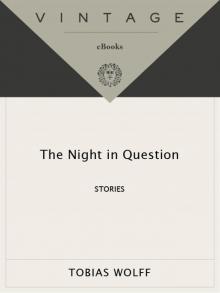 The Night in Question: Stories
The Night in Question: Stories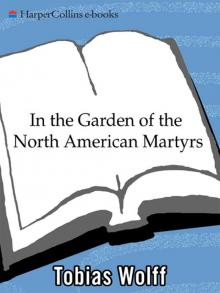 In the Garden of the North American Martyrs
In the Garden of the North American Martyrs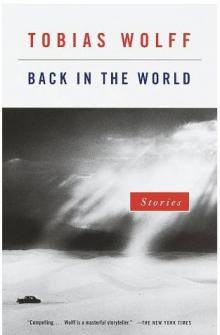 Back in the World: Stories
Back in the World: Stories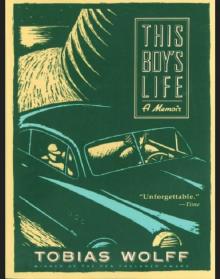 This Boy's Life
This Boy's Life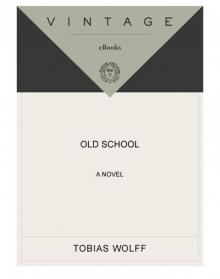 Old School
Old School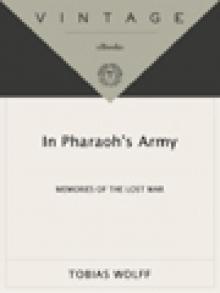 In Pharaoh's Army: Memories of the Lost War
In Pharaoh's Army: Memories of the Lost War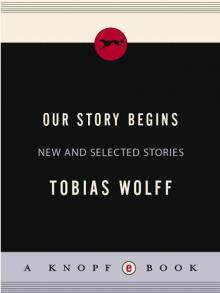 Our Story Begins: New and Selected Stories
Our Story Begins: New and Selected Stories The Barracks Thief
The Barracks Thief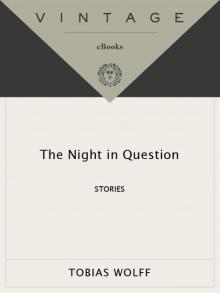 The Night In Question
The Night In Question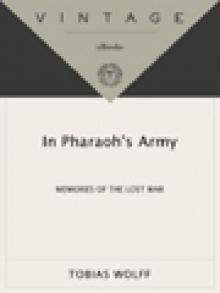 In Pharaoh's Army
In Pharaoh's Army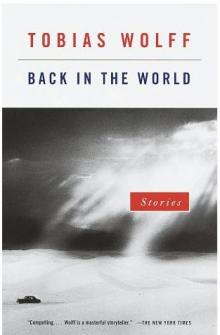 Back in the World
Back in the World